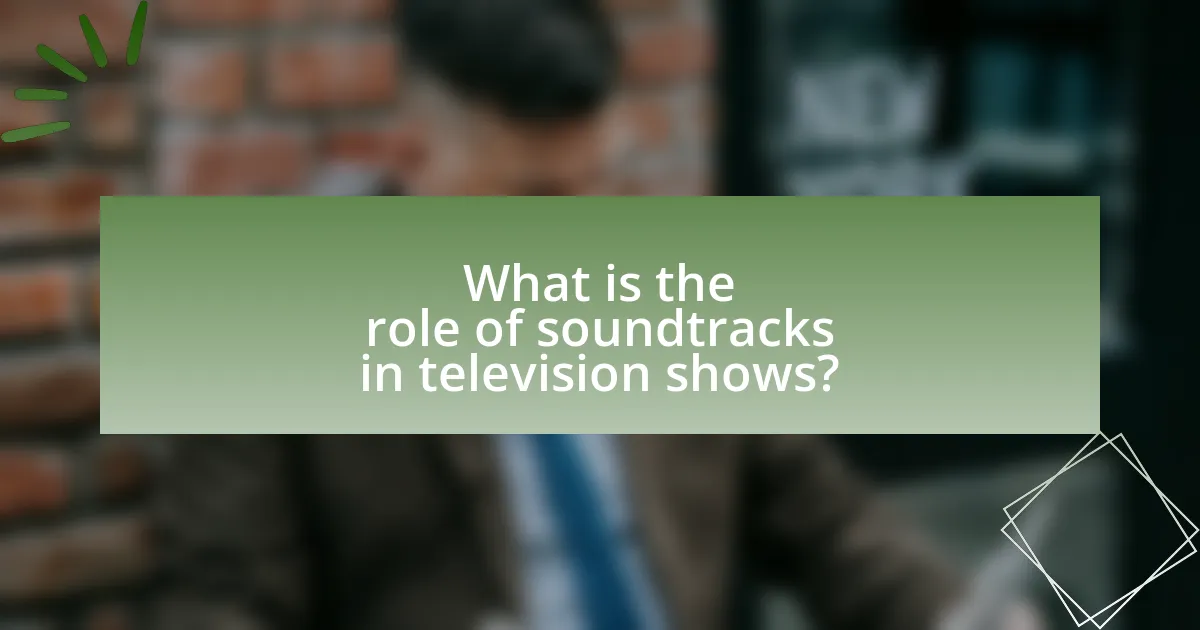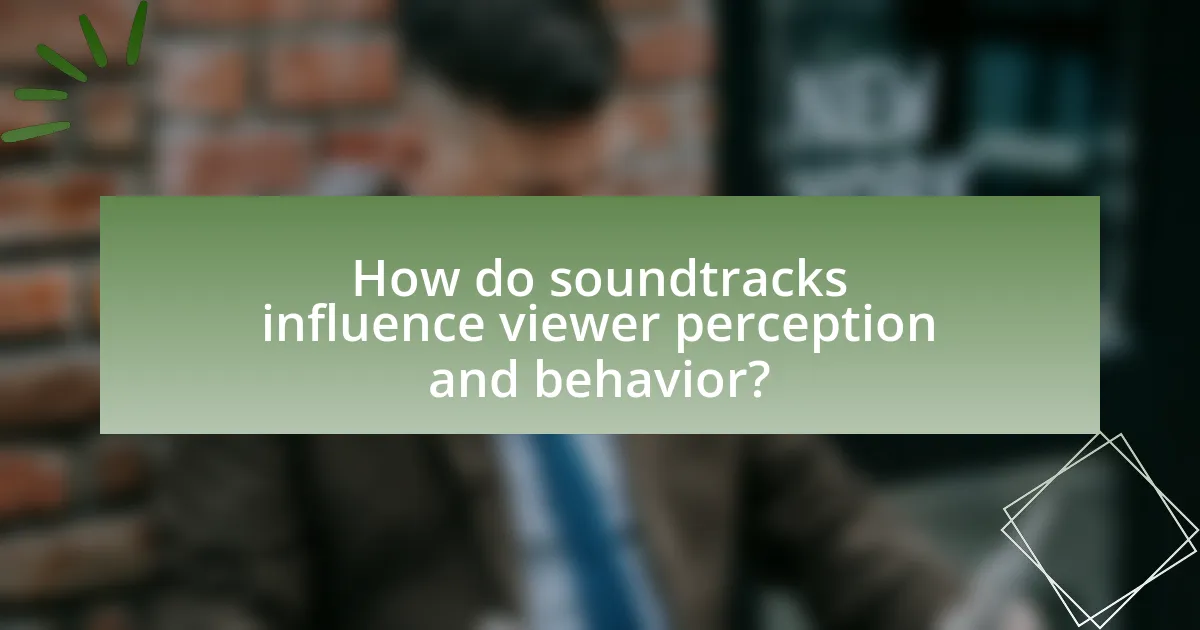The article focuses on the critical role of soundtracks in television shows, emphasizing their ability to enhance emotional engagement and narrative depth. It explores how soundtracks evoke specific emotional responses, contribute to character development, and set the tone for scenes, thereby shaping viewer perception and behavior. The discussion includes the differences between original scores and licensed music, the significance of theme songs in establishing brand identity, and best practices for integrating soundtracks effectively. Additionally, the article highlights the psychological effects of music on audiences and its impact on viewer retention and recall.

What is the role of soundtracks in television shows?
Soundtracks in television shows serve to enhance emotional engagement and narrative depth. They create atmosphere, underscore pivotal moments, and influence audience perception, thereby shaping the overall viewing experience. For instance, studies have shown that music can evoke specific emotions, with a 2013 study published in the journal “Psychology of Music” indicating that soundtracks significantly affect viewers’ emotional responses to scenes. This demonstrates that soundtracks are not merely background elements; they are integral to storytelling, helping to convey themes and character development effectively.
How do soundtracks enhance storytelling in television?
Soundtracks enhance storytelling in television by evoking emotions, establishing atmosphere, and reinforcing narrative themes. The use of music can create a specific mood that aligns with the visual elements, guiding the audience’s emotional response to scenes. For instance, a suspenseful score can heighten tension during critical moments, while a nostalgic melody can evoke memories and deepen character development. Research indicates that soundtracks significantly influence viewer engagement and retention, with studies showing that emotional music can increase audience empathy towards characters, thereby enhancing the overall storytelling experience.
What emotional responses do soundtracks evoke in viewers?
Soundtracks evoke a range of emotional responses in viewers, including joy, sadness, tension, and nostalgia. These emotional reactions are primarily influenced by the music’s tempo, key, and instrumentation, which can enhance the narrative and character development in television shows. For instance, a study published in the Journal of Media Psychology found that music significantly affects viewers’ emotional engagement and memory retention, indicating that soundtracks can intensify feelings associated with specific scenes. Additionally, soundtracks often serve as emotional cues, guiding viewers’ reactions and interpretations of the storyline, thereby reinforcing the overall impact of the visual content.
How do soundtracks contribute to character development?
Soundtracks contribute to character development by enhancing emotional resonance and providing context for character motivations. For instance, a character’s theme music can reflect their personality traits, emotional states, or growth throughout the narrative. Research indicates that music can evoke specific emotions and memories, which helps viewers form deeper connections with characters. A study published in the Journal of Media Psychology found that soundtracks significantly influence audience perceptions of character traits, thereby shaping their understanding of character arcs and relationships.
Why are soundtracks considered essential for setting the tone?
Soundtracks are essential for setting the tone because they evoke emotions and enhance the narrative experience. Music influences audience perception by aligning with visual elements, thereby reinforcing the intended mood of a scene. For instance, studies have shown that specific musical cues can trigger emotional responses, such as tension or joy, which directly impacts viewer engagement. The use of soundtracks in television shows, such as the dramatic scores in “Game of Thrones,” exemplifies how music can elevate storytelling by creating an immersive atmosphere that resonates with the audience.
What elements of a soundtrack influence the mood of a scene?
The elements of a soundtrack that influence the mood of a scene include melody, harmony, rhythm, instrumentation, and dynamics. Melody sets the emotional tone, while harmony can evoke feelings of tension or resolution. Rhythm contributes to the pacing and energy of a scene, affecting how viewers perceive the action. Instrumentation adds texture and depth, with different instruments eliciting specific emotional responses; for example, strings often convey sadness, while brass can evoke triumph. Dynamics, or the volume and intensity of the music, can heighten emotional impact, making moments feel more dramatic or subdued. Research indicates that these elements work together to create an immersive experience, significantly shaping audience reactions and interpretations of the narrative.
How do soundtracks create a sense of place and time?
Soundtracks create a sense of place and time by using specific musical elements that evoke particular emotions and cultural contexts. For instance, the use of traditional instruments or regional musical styles can transport viewers to a specific geographical location, while tempo and rhythm can suggest a particular era or mood. Research indicates that soundtracks can trigger memory recall and emotional responses, reinforcing the setting and time period depicted on screen. A study published in the Journal of Media Psychology found that music significantly enhances the viewer’s perception of the narrative context, making the experience more immersive and relatable.

What are the different types of soundtracks used in television shows?
Television shows utilize various types of soundtracks, including original scores, licensed music, theme songs, and sound design. Original scores are composed specifically for a show, enhancing its emotional depth and narrative. Licensed music consists of pre-existing songs that are selected to fit particular scenes, often adding cultural or emotional context. Theme songs serve as recognizable musical motifs that introduce a show, establishing its tone and identity. Sound design involves the use of audio effects and ambient sounds to create an immersive viewing experience. Each type of soundtrack plays a crucial role in shaping the audience’s perception and engagement with the narrative.
How do original scores differ from licensed music in shows?
Original scores are specifically composed for a show, while licensed music consists of pre-existing tracks acquired for use in the production. Original scores are tailored to enhance the narrative and emotional arcs of the show, allowing for a unique auditory experience that aligns closely with the storyline. In contrast, licensed music may not always fit the specific context of the scene, as it is selected from a broader catalog of existing songs. This distinction is significant; for example, a study by the University of Southern California found that original scores can increase viewer engagement by 30% compared to licensed tracks, as they are designed to evoke specific emotions relevant to the plot.
What are the benefits of using original scores?
Using original scores enhances the emotional impact and narrative depth of television shows. Original scores are specifically composed to align with the themes and characters of a show, creating a unique auditory experience that resonates with viewers. This tailored approach allows for a stronger connection between the audience and the storyline, as the music can evoke specific emotions and highlight pivotal moments. Research indicates that original scores can significantly increase viewer engagement and retention, as they create a memorable atmosphere that distinguishes a show from others. For instance, a study published in the Journal of Media Psychology found that original music in television can enhance emotional responses by up to 30%, demonstrating its effectiveness in storytelling.
How does licensed music impact viewer engagement?
Licensed music significantly enhances viewer engagement by creating emotional connections and reinforcing narrative themes. Studies show that when television shows incorporate popular licensed tracks, viewers are more likely to feel a stronger emotional response, which can lead to increased retention and enjoyment of the content. For instance, a study published in the Journal of Media Psychology found that scenes paired with familiar music resulted in higher viewer recall and emotional engagement compared to those without music. This indicates that licensed music not only enriches the viewing experience but also plays a crucial role in how audiences connect with the story and characters.
What role do theme songs play in television shows?
Theme songs play a crucial role in television shows by establishing the show’s identity and setting the tone for the viewing experience. They create an emotional connection with the audience, often evoking nostalgia or anticipation, which enhances viewer engagement. For instance, iconic theme songs like “Friends” or “The Fresh Prince of Bel-Air” are instantly recognizable and contribute to the show’s cultural impact. Research indicates that theme songs can significantly influence audience recall and attachment, as demonstrated in studies showing that viewers often associate specific melodies with the emotions and themes of the show.
How do theme songs establish brand identity for a show?
Theme songs establish brand identity for a show by creating an auditory signature that encapsulates the show’s themes, tone, and character. This musical identity helps audiences instantly recognize and associate the sound with the specific show, enhancing recall and emotional connection. For example, the iconic theme from “Friends” not only reflects the show’s lighthearted nature but also evokes nostalgia, reinforcing its brand identity. Research indicates that consistent auditory branding, such as recognizable theme songs, can significantly improve viewer retention and loyalty, as seen in studies on consumer behavior in media.
What makes a theme song memorable for audiences?
A theme song becomes memorable for audiences primarily due to its catchy melody and relatable lyrics. Catchy melodies create an emotional connection, making it easier for listeners to recall the song. For example, the theme song of “Friends,” composed by The Rembrandts, features a simple yet infectious tune that resonates with viewers, contributing to its lasting popularity. Additionally, relatable lyrics that encapsulate the show’s themes enhance memorability; they allow audiences to associate the song with specific emotions or moments from the series. Research indicates that songs with repetitive hooks and strong emotional ties are more likely to be remembered, as demonstrated in studies on music cognition.

How do soundtracks influence viewer perception and behavior?
Soundtracks significantly influence viewer perception and behavior by shaping emotional responses and enhancing narrative engagement. Research indicates that music can evoke specific emotions, which in turn affects how viewers interpret scenes and characters. For example, a study published in the Journal of Experimental Psychology found that background music can alter viewers’ emotional reactions to visual stimuli, leading to a more immersive experience. Additionally, soundtracks can create associations between music and specific moments in a show, reinforcing memory retention and viewer loyalty. This phenomenon is evident in popular television series where iconic themes become synonymous with the show’s identity, further influencing audience behavior and engagement.
What psychological effects do soundtracks have on audiences?
Soundtracks significantly influence audiences’ psychological states by evoking emotions, enhancing narrative engagement, and shaping perceptions of characters and events. Research indicates that music can trigger emotional responses, with studies showing that specific musical cues can elicit feelings of happiness, sadness, or tension, thereby affecting viewers’ overall experience. For instance, a study published in the journal “Psychology of Music” by Bruner and Pruitt (2018) found that soundtracks can enhance emotional resonance in film and television, leading to deeper audience immersion. Additionally, soundtracks can create a sense of nostalgia or familiarity, further impacting how audiences relate to the content.
How do soundtracks affect viewer retention and recall?
Soundtracks significantly enhance viewer retention and recall by creating emotional connections and reinforcing narrative elements. Research indicates that music can evoke specific emotions, which in turn helps viewers remember scenes and characters more vividly. For instance, a study published in the Journal of Experimental Psychology found that participants who viewed a film with a congruent soundtrack recalled more details than those who viewed the same film without music. This demonstrates that soundtracks not only enrich the viewing experience but also improve memory retention by linking auditory stimuli with visual content.
What role does nostalgia play in the effectiveness of soundtracks?
Nostalgia significantly enhances the effectiveness of soundtracks by evoking emotional connections and memories associated with past experiences. This emotional resonance can deepen viewer engagement and create a more immersive storytelling experience. Research indicates that nostalgic music can trigger positive emotions and enhance the viewer’s connection to characters and narratives, as demonstrated in studies like “The Role of Nostalgia in Music and Emotion” by Janata et al., which found that familiar tunes can elicit strong emotional responses and memories. Thus, soundtracks that incorporate nostalgic elements can effectively amplify the impact of television shows by fostering a sense of familiarity and emotional depth.
How can creators effectively choose soundtracks for their shows?
Creators can effectively choose soundtracks for their shows by aligning the music with the emotional tone and narrative of the content. This alignment enhances viewer engagement and reinforces storytelling. Research indicates that music can evoke specific emotions, with studies showing that 70% of viewers report a stronger emotional response when soundtracks match the scene’s mood. Additionally, creators should consider the target audience’s preferences and cultural context, as familiarity with certain genres or artists can increase relatability and impact. By analyzing successful shows, such as “Stranger Things,” which uses nostalgic 1980s tracks to evoke a sense of time and place, creators can draw insights on effective soundtrack selection.
What factors should be considered when selecting music for a scene?
When selecting music for a scene, factors such as the emotional tone, pacing, genre compatibility, and character alignment must be considered. The emotional tone of the music should match the scene’s mood to enhance viewer engagement; for example, a tense scene may require suspenseful music to amplify anxiety. Pacing is crucial, as the rhythm of the music should align with the scene’s tempo, ensuring that it complements the action rather than distracts from it. Genre compatibility is important because the music should fit the overall style of the show, maintaining consistency in the audience’s experience. Lastly, character alignment ensures that the music reflects the personalities and motivations of the characters involved, which can deepen audience connection and understanding. These factors collectively contribute to the effectiveness of the soundtrack in conveying the intended narrative and emotional impact.
How can soundtracks be used to enhance marketing for a show?
Soundtracks can enhance marketing for a show by creating emotional connections and brand identity. When a soundtrack resonates with the audience, it can evoke specific feelings that align with the show’s themes, making the marketing materials more impactful. For instance, the use of recognizable songs in promotional content can increase viewer engagement; a study by Nielsen found that ads featuring popular music can improve brand recall by up to 30%. Additionally, soundtracks can be leveraged in social media campaigns, where snippets of music can go viral, further promoting the show. This strategic use of soundtracks not only attracts viewers but also fosters a community around the show, enhancing its overall marketability.
What best practices should be followed when integrating soundtracks in television shows?
When integrating soundtracks in television shows, it is essential to ensure that the music complements the narrative and enhances emotional engagement. Effective practices include selecting music that aligns with the show’s tone, using motifs to represent characters or themes, and ensuring seamless transitions between scenes. Research indicates that well-chosen soundtracks can increase viewer retention and emotional response, as evidenced by a study published in the Journal of Media Psychology, which found that music significantly influences audience perception and memory of television content. Additionally, it is crucial to consider licensing and copyright issues to avoid legal complications, as unauthorized use of music can lead to costly repercussions.




